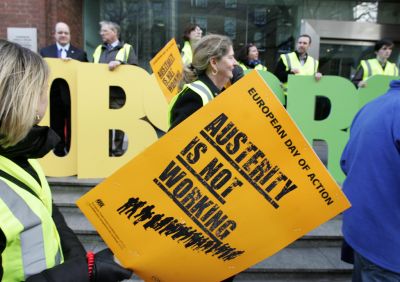The ILO, the UN agency, in its World Social Protection Report 2014/15 (whose recommendations are based on consensus among governments, employers and workers’ organisations), has found that “poverty and social exclusion, now affecting 123 million people in the European Union, 24 per cent of the population, many of them children, women, older persons and persons with disabilities. The cost of adjustment has been passed on to populations, who have been coping with fewer jobs and lower income for more than five years. Depressed household income levels are leading to lower domestic consumption and lower demand, slowing recovery. The achievements of the European social model, which dramatically reduced poverty in the period following the Second World War, have been eroded by short-term adjustment reforms.”
Commenting on this report, Bernadette Ségol, General Secretary of the European Trade Union Confederation (ETUC), said “A UN agency is showing that the cost of the crisis in Europe has been passed on to ordinary people. The mistakes of the bankers and financial sector have been paid for by ordinary men, women and children, and yet even yesterday Commissioners were expressing their satisfaction with the economic policies they have been pursuing.”
“I never want to hear another leader talk about the crisis being over until Europe’s 26 million unemployed are back to work. I have been saying it for some time, but austerity is not working, and the ILO have provided the proof. There needs to be investment in growth and in jobs. Not just expressions of concern, but real changes in policy. That is the challenge facing the new European Parliament and European Commission. It is not the time to delay appointing a new President of the European Commission, it is time to repair the enormous damage caused by making ordinary people pay the price of the crisis".

